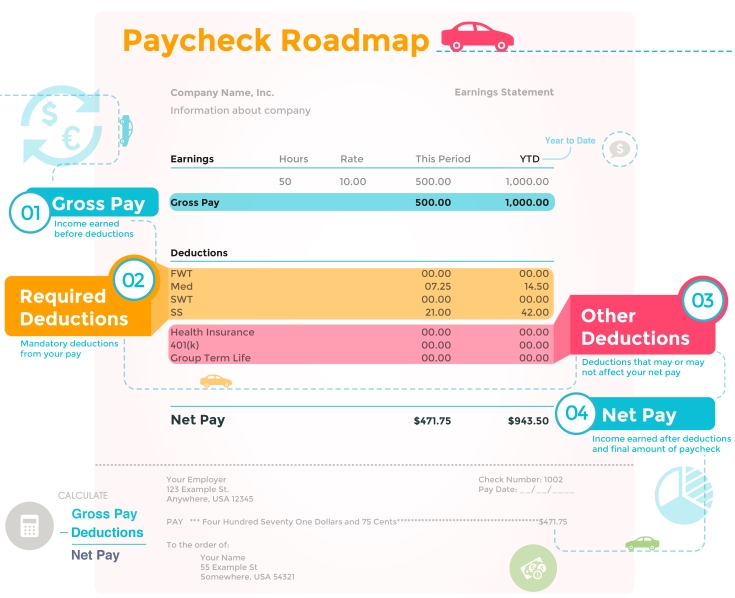 “It’s exciting to earn your first paycheck, but you should know that the information on the pay stub or online statement could be important to you as well.”
“It’s exciting to earn your first paycheck, but you should know that the information on the pay stub or online statement could be important to you as well.”
Congratulations! You’ve just landed a new job. Here are some important things to be aware of before you receive your first paycheck.
When will I receive my paycheck?
How often will you be paid? Typically, your payday will depend on the company you work for and which state you work in. You might be paid on a weekly, bi-weekly, bi-monthly, or monthly basis. Regardless of your employer’s pay period, expect to receive your paycheck on your employer’s set payday.
Bear in mind that state law requires your employer to pay you in a timely manner. Employers cannot pay less often than required, but they are allowed to pay more frequently.
How will I be paid?
You should expect to receive your money either by direct deposit or check. Direct deposit automatically puts your paycheck into your checking or savings account. This payment method is paperless, but you’ll still have access to a printed or electronic statement that shows information similar to what is on a physical pay stub attached to a check.
Your statement or pay stub will display important information relating to the money you’ve earned. You’ll see the date of payment, the pay period dates, how many hours you’ve worked, wages earned (both before and after taxes), and any other deductions.
Direct deposit may or may not be required by your employer, depending on which state you work in. You might find that the advantages of signing up for direct deposit, such as not having to worry about your check getting lost or stolen and accessing funds quickly, make it more favorable than receiving a physical paycheck. Think about which payment method works best for you and helps you the most in managing your money.
What does the information on my pay stub mean?
Whether you opt for a check or direct deposit, you’ll receive a summary of tax information each pay period. You might be tempted to ignore this information, but you should understand what it means and why it’s important.
The following terms and acronyms commonly appear on pay stubs. If you know what the abbreviations stand for, you’ll have an easier time decoding your statement.
- Gross Pay — The amount of money you’ve earned during a given pay period before deductions and taxes.
- Net Pay — Your total income after deductions and taxes are taken into account.
- Year to date (YTD) — The amount of money you’ve earned since the first day of the calendar year. You may notice year-to-date information in both the deductions section and the pay section.
- Federal Income Tax (FIT, FT, FWT) — Remember the W-4 form you had to fill out when you were hired by your employer? The information you provided on the W-4 is used to determine the amount that will be withheld from your paycheck for taxes. The more allowances you claim, the less money will be withheld.
- State Income Tax (ST, SWT) — The amount of state income tax withheld from your paycheck, which will vary depending on where you live.
- Social Security Tax (SS, SSWT) — Employers are required to withhold Social Security taxes from employees’ paychecks.
- Medicare Tax (MWT, Med) — The federal government requires your employer to withhold a certain amount of your paycheck to fund Medicare.
Social Security and Medicare taxes are also known as Federal Insurance Contribution Act (FICA) taxes or payroll taxes. Your employer is required to withhold 6.2% of your gross income for Social Security taxes (up to a certain annual limit) and 1.45% for Medicare taxes. Your employer also matches these FICA taxes.
What other information might appear on my pay stub or statement?
Depending on the company and your employment status, you might notice some additional deductions appearing on your pay stub or statement.
This may include pretax and after-tax deductions. Pretax deductions (such as for medical insurance and 401(k) or 403(b) retirement plan contributions) are taken out before taxes and reduce your taxable income. After-tax deductions (such as for Roth 401(k) contributions) don’t affect your taxable income.
Contact your human resources department for further explanations of the information on your pay stub or statement. If you think there is a miscalculation on your paycheck, don’t hesitate to reach out to them.
Link to Printable PDF: Understanding Your Paycheck
|
|
| Prepared by Broadridge Advisor Solutions Copyright 2020. |



